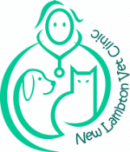cocky is tucked up in bed after a quick anaesthetic and X-ray to rule out a fracture in his sore wing. At New Lambton Veterinary Clinic we have several clients who bring injured wildlife to see us, often going to a great deal of trouble to climb and rescue them from tangles of fishing line in trees, or to stop their cars on busy roads. It can be hard to know what to do if you find and injured animal. Here is a quick guide:
Adult Birds: If possible throw a towel over the bird before placing gently in an enclosed container such as a shoe box with air holes punched in. Keep the bird quiet warm and in the dark and offer a drink by mouth with an eyedropper (but don’t panic if he doesn’t want to drink). Bring him straight in, or contact the Native Animal Trust Fund. If you can’t catch the bird, the Native Animal Trust Fund should be able to send someone to help you. Birds are territorial so make sure you keep a record of where you found him so that on release he can go back home and not cause social disruptions in a new location.
If you find an uninjured baby bird on the ground (usually in spring and summer) it is probably a fledgling trying out its wings. If you are sure you can see the parents it is possible to get the baby off the ground by building a substitute nest out of an ice-cream container or basket – make sure you punch a few holes in the bottom to allow rain to drain through, and line the bottom with soft twigs and leaves. At our clinic we have tried many times to replace babies back into their own nests with no success at all. They need to be somewhere up from the ground where you can check that their parents are feeding them and that they are safe.
Lizards should be gently coaxed or placed into a box and either removed from harm’s way (if they have wandered into a pet dog’s back yard for instance) or if injured, brought in to the clinic.
Snakes should NOT be approached. The Native Animal Trust Fund will be able to advise you of what to do if the snake decides to stay in your back yard, but mostly they are brief visitors and move on quickly. If injured try to observe them until a carer comes to remove them
Possums have very sharp claws and should be approached with care. Throw a thick blanket over them and place in a sturdy box. Keep in the quiet and warm and dark until you can get him in to us or to a Native Animal Trust Fund carer.
Bats should not be handled unless you have had a rabies vaccination. They should be reported to the Native Animal Trust Fund if they are seen alone during the day, or if they are hanging from power lines (they could have been electrocuted with a baby in the pouch).
The number for the Native Animal Trust Fund is 0428628483.
If you find an injured animal and our clinic is closed, our friends the after hours vets at the Animal Referral and Emergency Centre can be contacted on 49577106.
